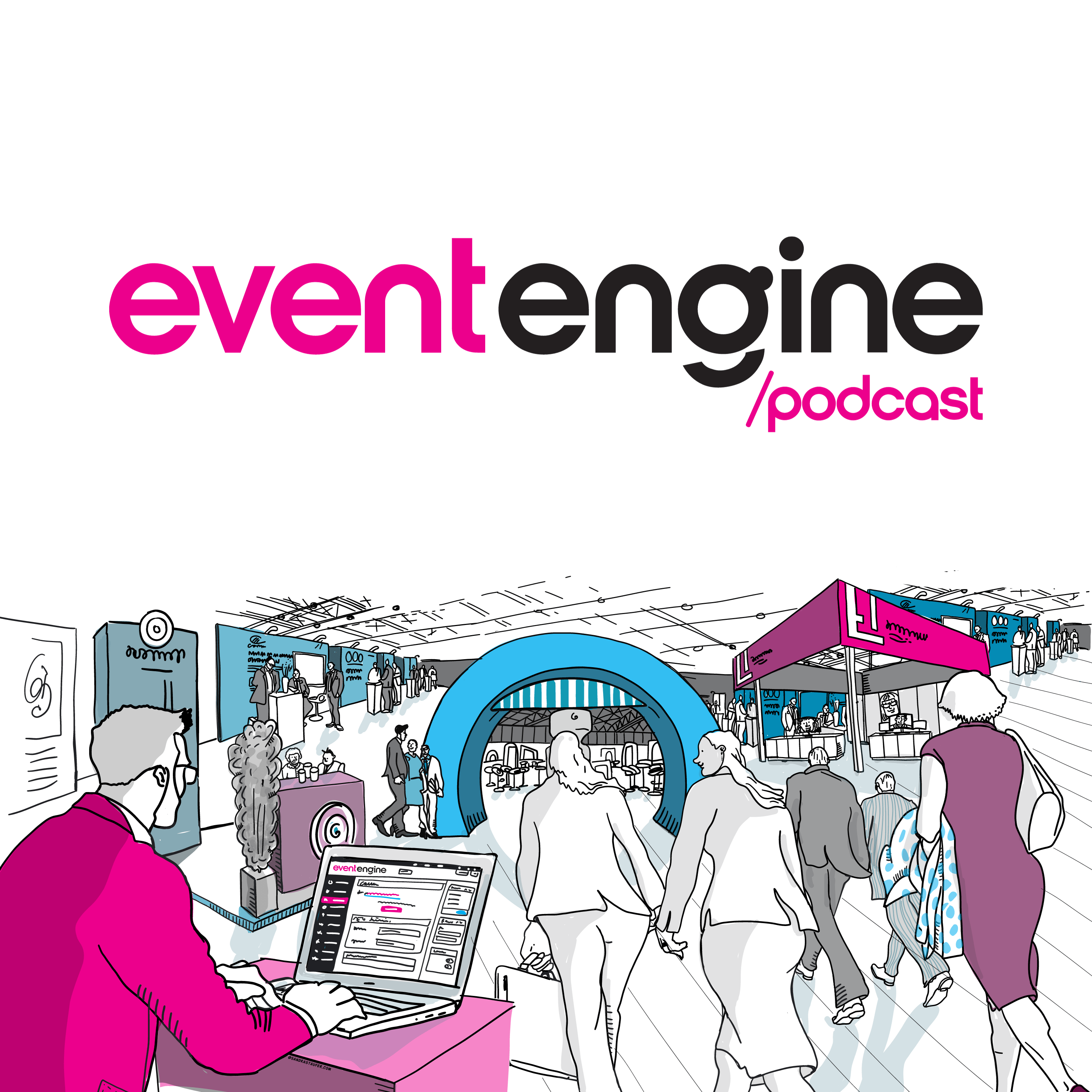We harness AI and voice recognition to generate transcripts, which we subsequently review and edit. However, due to conversational nuances and technical jargon, absolute accuracy cannot be guaranteed.
Lee:
Welcome to the Event Engine podcast. My name is Lee, and today we’re with back for a second time.Yes.It’s one and only Lisa. How are you doing? Good. Yeah. Folks, I mentioned that there is a previous episode where we discussed the Zoom, in fact, wasn’t it? A study that had been released, and that is a timeless classic episode. In the show notes will be a link to that episode for 2023. You are now back to have a little to catch up with us. I guess first, for the folks that don’t know you, could you do a little quick potted history of yourself? Then we’re going to discuss what you’re talking about tomorrow here at the show.
Lisa:
Yeah, absolutely. Again, my name is Lisa Schulteis. I am the founder of two companies, ElectraLime Marketing, which is an event planning management production company, and then your event marketplace, which is a global online directory for the event industry. In my spare time, I’m also the executive director of the Northwest Event Show in Seattle. Then I internationally. I have four jobs. We’re good.
Lee:
Amazing. Yeah. But presumably always feeling energised by it all.
Lisa:
I love this industry so much. It’s fun, it’s energetic, it is family. I love it and love travelling all over, love doing the events, love speaking at the events, and just have a lot of fun. Yeah.
Lee:
Whereas I like to sit at home and knit at the moment, I’m absolutely like going all in on.
Lisa:
I saw your post the other day with the hair. That was hysterical where you had knitted your hair. It was amazing. Look him up on LinkedIn and look for that post because it was..
Lee:
I really wasn’t joking. Sitting at home, knitting is my idea of an international jet setting life at the moment. Well, you’ve facilitated today, which has been phenomenal. I’ve popped by a few times. I saw you doing a talk, and then you’ve had people on the stage over the event sustainability life section of this event. Now, I understand you’re going to be talking tomorrow. Could you give us a little synopsis on what it is you’re going to be talking about?
Lisa:
Yeah. Tomorrow, it’s going to really be… The talk is titled Wired for Engagement, and it really is talking about the neuroscience of events. My background in my previous life before kids was neuropsychology. I used to work with Alzheimer patients and brain injury patients and stroke patients, and both on the research and the clinical side. Now this has allowed me to really bring that piece that I love and marry it into the events world because there’s so many things with the way our brain works, and we can make our events more meaningful and more engaging to people if we’re thinking about how the brain works and how we can tie those two together.
Lee:
Could you give us a couple of examples then?
Lisa:
Even from a multi-sensory standpoint, right? If I am standing on stage and I’m just speaking at you, you’re watching me with your eyes, you’re hearing me with your ears, and that’s about it, right? I always hate when I have the one o’clock or two o’clock session because you’re literally watching the people in the audience fall asleep because they just had somewhere, right?
Lisa:
I’m incorporating two of their senses there.
Lisa:
But if I can incorporate three or four or five, now I have different touch points of ways that I can interact with them, which not Family are going to be more interesting to them, but we all react to things differently. I’m a very visual person. If you show me something, let’s say the art on the wall, and let’s say you’re trying to describe something to me, and you show me this picture on the wall behind us, I can understand that really well. If you talk to my husband, who’s a very black and white logistical person, he’s the numbers person. He has to everything explained out and detailed out in front of him. If I say, Well, just imagine, if we put this amazing blue to drape up on the wall, and he’s like, Yeah, he can’t. We all process information differently anyway. Then if we can take and bring in those different senses, then that’s allowing us to connect with people in a whole different way. Even anything from you think about projection mapping, for example, especially during COVID, too, some of the immersive experiences. You’ve got the van go emersion. You’ve got the different museums that were doing things where you could be in the museum without being in the museum, physically.
Lisa:
But it’s enveloping that sense of now it’s 3D and it’s all wrapped around you to bringing in taste.
Lisa:
That’s the one that people don’t bring in a lot of times. I don’t know about you. I socialise much better over food than in any other situation.
Lee:
I think we’re all white, virtually.
Lisa:
I travel to eat, if you guys haven’t noticed.
Lisa:
But if we can bring in food to an experience, it makes it that much more into that experience.
Lisa:
It’s one of the reasons that we love to sit down at a table across from people and have conversations while we’re shoving food in our face. But it’s a little bit more of a different bonding experience than me just talking to you. Okay. Part of the talk tomorrow, we’ll be talking about multi sensory. Some of it we’ll be talking about, even from an inclusivity standpoint, how do we do things differently so that maybe somebody who’s neurodivergent, they’re going to experience an event differently than you’re going to or than I’m going to. Even us introverts in the world, we experience events very differently than somebody who is an extrovert. We want to be able to look all of those different things and the way our brain works and dopamine and all of those things to be able to really start looking at, can we design our events differently to give them a different experience?
Lee:
So weirdly enough, Tim and I were having a conversation which sounds scarily similar to what you’re just saying here, two minutes before you came up to us. That’s funny. So 10 years ago, this environment here would have energised me. I would have been buzzing. I’d have stayed late for the drinks. I’d have stayed and gone on to the after parties and stuff like that. That was me 10 years ago. I said, whereas right now I’m exhausted from this day one. I’ve been interviewing people. It’s been lovely to meet people. I’ve met a lot of people in that, but I feel utterly exhausted. I’m actually ready to go and jump on a train and go home and go and knit. Do you know what I mean? I said to him, I don’t understand what’s changed, but I feel like I’ve gone from being that extroverted, energetic person to now being the total opposite, where I’m here and I’m engaging and I’m enjoying. But also there’s a big part of me that just now wants to be back home. I’m tired. I feel much more introverted than I ever used to be. I don’t know whether maybe that was COVID or whatever.
Lee:
He mentioned, I don’t know whether you think he’s onto something, but he said, Perhaps it’s where you get your energy from now, whereas he feels he gets energy from the interactions he’s here. He’s keeping energised all day, whereas I feel like I’m giving of myself somehow throughout the day. By the end of the day, I’m just exhausted. Could you speak into any of that? Because I’m still trying to work this out. That’s not to be a negative against ETL. No. It is It’s a great event and I’m having a great time, but I’m also exhausted.
Lisa:
Yeah, it’s by person, too. People never believe me. I’m a huge introvert. No one ever believes me because I can fake it all day long.
Lee:
Same.
Lisa:
No question. No question. But it takes so much energy for me to… Speaking doesn’t really bother me because speaking for me is teaching. I have a different perspective of it, and I love speaking because I get to interact with people and teach them something new.
Lee:
It resonate there.
Lisa:
But for an introvert, walking this floor is exhausting because you’re just putting all of that energy into those conversations. That’s part of it, too, of all the the events that happen at night, all of these different shows and events. I get to about five o’clock and I’m like, Okay, I have to go. I have to go. I have to get right. Because I need to get everything that I can out of the event, and I need to build those relationships and build those partnerships. But my hotel room and I, by the end of the day, I’m like, Don’t look at me. Don’t talk to me. I’m going in my room. People are like, Oh, come down to the lobby. I’m like, Yeah, no, I’m done. But I think we all have different personalities. I know other people, I have friends here that they’re like the Energizer Bunny, right? They thrive on this. For them, they have a different experience, and it seems like they can go forever and ever and ever and ever, and I just want 10% of that energy. But it’s the way we’re wired, right? We have different personalities, we have different experiences, and some of that goes back to somebody may have attended an event that maybe they have a great experience at.
Lisa:
Now they have that preconception, and they’re living off of that as well. There’s a lot of different things. You’ve got noise levels, and you have bright lights, and all of these different things that Those all affect your energy. It all affects the way that your brain is perceiving things. There’s different things in different spaces that we can work on within our events to to even give people a break. Maybe have a quiet place that they can go. Maybe there you have dim music and you have very soft… Sorry, dim lighting and very soft music, and it just has a different feel and a vibe in it. But it’s just a place to go and recharge for five minutes. Sometimes I’ll leave the floor and I just go out into the hallway or I go somewhere else, again, just to recharge. Then I come back and it’s like, Great, let’s go. But you do have to consider all of those different areas to see how can we work with people to give them that different experience.
Lee:
Yeah. Does this go beyond just as well? Sorry, We’ve talked here about, say, the physical location, but does this also go further with regards to your overall communication strategy leading up to an event and post?
Lisa:
Yeah, absolutely. So whatever it is that you’re going to include that’s different, whether it’s a quiet room, whether it is maybe a different sensory experience, whatever, you definitely want to communicate that ahead of time so that people know that they can expect it. Even down to just the simple needs of life. Let’s say that you allow moms to bring their small babies to an event, and if you’re going to have a place for them to nurse their babies, let people know that there’s a place to nurse your babies. Anything that you’re doing that’s different or anything that you want to really communicate to people, you definitely want to do that pre-event and let them know.
Lee:
No, that’s so true. Going back into your own experience, obviously, you said you got your previous experience. What have you seen from event organisers which has made you wince, I guess, is the right phrase? Oh, my gosh.No names mentioned.
Lisa:
The things that make me wince.
Lee:
But I think we can learn from other people’s mistakes, can’t we?
Lisa:
That could be a really long list. I think noise level is a huge one for me. Probably one of my biggest pet peeves is when you go to a networking event, and I’m sitting probably closer to you than this, and I still can’t hear you because the noise level, they’ve got the DJ going, or they have something going on that the noise level is just so high. That’s probably one of my biggest pet peeves is, pick your environment based on what the purpose is of that particular session or that particular event. If it’s a networking event, you want some music, you want to keep the energy in the room. But if your intention is for people to actually have conversations and build relationships, the energy needs to be there, but it needs to not overtake everything.
Lee:
It’s not a Club 18 to 30 party. This is a..
Lisa:
Correct. I will admit all the time I’m like, Yeah, I’m too old for those 1 AM to 3 AM parties in the nightclubs. I’m like, Yeah, you all go have fun. I’m I can go into bed. But yeah, noise level is probably one of my biggest pet peeves. Then you do have to be careful if you’re doing any lighting that is flashing. Sure. That’s something that you need to to warn people about. You see that in stadiums all the time, in sports venues. They’ll forewarn you and say, Hey, this has flashing lights coming up, or for those who are sensitive. But flashing lights can really be- Very triggering. Very distracting, and then also can really trigger people that… For me, if there’s a strobe light in the room, it actually makes me dizzy. I have to leave. You just have to be aware that different people have different needs and different experiences. But yeah, my number one is noise level.
Lee:
We’ve been actually quite lucky here at ATL. The noise levels are pretty good. Obviously, we can hear each other because we’re in microphones and headsets. But even before we did this, we could hear each other and have a decent conversation. The stands are well-spaced. We’re not all crammed together. There is a stand over there where now and again, I hear a little bit of music, but it’s not too loud. I don’t know what it’s like right next to it.
Lisa:
Yeah, and they’ve done a really good job here because you can still feel the energy of the floor. That’s what we all love. We want to feel the energy of the floor. You may be able to hear a little bit in the feedback on the mics, but it’s great walking around because you can feel that there’s a lot of people here. You can feel that there’s great energy, but it’s not overwhelming.
Lee:
Absolutely.
Lisa:
You’re right. I can have a conversation with anybody I want and not feel like I need to shout at them. I don’t feel like I need to fight for the attention. I love the on this floor.
Lee:
With regards to things like escape, obviously, if you’re watching on YouTube, you can only just see this little corner, but right out there, we’re at the Excel, so there is a huge hallway, and I’ve done it at least three times already, where I’ve gone down to the furthest coffee shop I could find away from here and just went and sat in there for a bit. There’s plenty of space to just go out and escape and then just come back in again. Making the in and out traffic very easy, I think. It’s actually something that I enjoyed about the event last year as well. They used to have a venue at… Do you remember when it was at the Truman Hall, I think it was, or Brewery?
Lisa:
No, I’ve only been here.
Lee:
Okay, so it was the Brewery, and it was a very old building. Nice place. Had a big auditorium, but then lots of smaller ones. We were in one of the smaller halls. I just remember back then feeling very secluded away from the energy of the event, tucked away, which was fine. We still met with people, et cetera. But also I felt a trapped there as well. Whereas this vibe here is really nice because it’s one big open space. And even though it’s two events, it also feels like the same event, doesn’t it?
Lisa:
Exactly. Yeah. They do a good job of co-hosting both of the events It’s a good use of space.
Lee:
So kudos, Mr. Parry. Well done.
Lisa:
Yeah, very well done.
Lee:
Another cracking event and team, obviously. I know it’s not just Adam.
Lisa:
Yeah, he’s got a great team.
Lee:
He has, hasn’t he? Absolutely. No worries. So what What are you hoping people… What’s the biggest takeaway you’re hoping people will walk away with tomorrow, and then we’ll just say goodbye?
Lisa:
I think tomorrow is just a matter of take a look at your event and take a look at it a little bit differently. If you can implement one thing Or just be aware of one thing. You may not have to do something new, but maybe now you’re more aware of something that you can say, Okay, we need to maybe evaluate this and see if we need to change it or if we’re doing it well. Really just focusing on that and taking a new look at how you’re producing your event and see where there’s some room for change and room for increasing engagement and connecting with people.
Lee:
Brilliant. Well, thank you so much for your time.
Lisa:
Thank you for having me.
Lee:
What is the best way for people to connect with you?
Lisa:
That would probably be on LinkedIn. We’ll put that link.
Lee:
We will. We’re BFFs on LinkedIn. Folks, there will be a link in the show notes to connect with Lisa.
Lisa:
Perfect.
Lee:
Thank You.
Lisa:
Thanks for having me.
Lisa:
All right, put it there. Always.
Lee:
Awesome..



